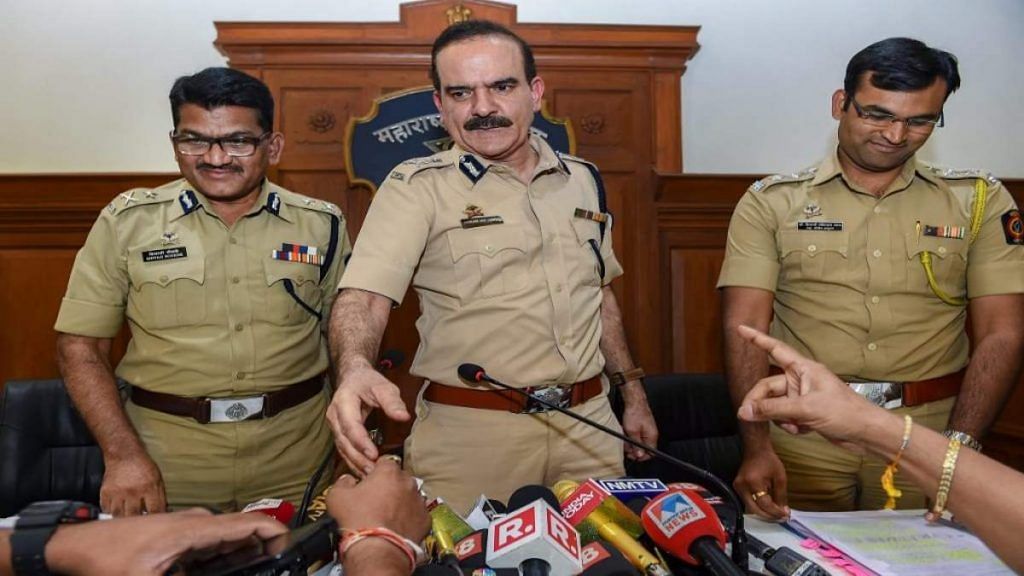Mumbai: The Maharashtra government’s decision to revoke an internal reshuffle ordered by Mumbai Police commissioner Param Bir Singh has triggered fresh speculation of differences within the Maha Vikas Aghadi (MVA) coalition.
Singh had shuffled 10 deputy commissioners of police within Mumbai Thursday, but the decision was withdrawn by the government without explanation Sunday.
The move has stirred up a controversy because it’s unusual for a police commissioner’s call on internal transfers to be stalled by the government, and has been seen as a lack of coordination among the three parties in the ruling alliance — the Congress, the Shiv Sena and the Nationalist Congress Party (NCP).
While the home department, which oversees police, is handled by Anil Deshmukh of the NCP, the cancellation of the transfers is said to have been undertaken at the behest of Chief Minister Uddhav Thackeray.
Deshmukh, however, has denied that the episode exposes differences within the alliance, telling the media Sunday that he had taken the decision in coordination with Thackeray, who is the chief of the Shiv Sena.
Also Read: Shiv Sena mouthpiece slams Congress, airs Maharashtra ruling alliance’s dirty laundry
‘Police commissioner well within rights’
According to police sources, Thackeray was not personally made aware of the transfers even though they were implemented under Section 22 (N) (2) of the Maharashtra Police Act, 1951, which gives chief ministers the powers to order mid-term transfers of any police personnel in exceptional cases or in public interest.
The sources, however, said the Mumbai commissioner of police was well within his rights to effect internal changes. The Mumbai Police, they added, had sought the approval of the home department, and Deshmukh “was also aware about the transfers”.
A former IPS officer who did not wish to be named said, “IPS transfers require the approval of the chief minister’s office, but the shuffling of DCPs within the Mumbai Police should not be seen as transfers. They are basically internal changes, and the commissioner of police should have the rights to manage his own manpower.
“In the past, Mumbai commissioners of police have shifted deputy commissioners of police and inspectors from one place to another within the city without seeking the approval of the state government,” the IPS officer added.
Ultimately, the officer said, it is up to every individual police commissioner how he wants to maintain and manage an equation with the political bosses, whether the officer feels the need to inform them about his or her decisions. “Officers generally play it by the ear,” the IPS officer said.
The appointments of DCPs and inspectors have been an ongoing issue in the state, with the political class trying to assert its rights in this area every now and then, sources claimed.
“But, until now, any opposition to such a decision by the police commissioner was just in the form of murmurs,” a second former IPS officer said.
In cases where political equations are as it is delicate, the officer added, the IPS officer in charge should be even more sensitive about what he or she tells the politicians in charge, and who all are kept in the loop.
ThePrint reached Sitaram Kunte, additional chief secretary, home, by phone and texts, but he did not comment. Police commissioner Param Bir Singh did not respond to calls.
There have also been reports of some Shiv Sena functionaries and leaders being unhappy with the appointments of specific DCPs in their area. On Sunday, Param Bir Singh went to Matoshree, Thackeray’s residence, to discuss the issue with the chief minister.
Also Read: Making an ideological compromise: How Maharashtra’s Shiv Sena-Congress-NCP govt can survive
The Shiv Sena-NCP rift
Speaking to the media Sunday, Deshmukh played down allegations of coordination issues between him and Thackeray on the matter. He emphasised that the revoking of the transfers was a joint decision. Deshmukh also sought to disassociate himself from the transfers, saying it was the police commissioner’s decision.
In a video statement released Sunday night, Deshmukh said, “Regarding the various news reports about transfers within the Mumbai Police, the truth is that the internal transfers, which the Mumbai Police commissioner implemented, have been scrapped by my office and the chief minister’s office. In our Congress-NCP-Shiv Sena government there is very good coordination and there are no differences in opinion.”
Political commentator Hemant Desai, however, expressed doubt.
“The fact that Deshmukh felt the need to give a clarification that there were no differences between him and the chief minister suggests that there is an issue. In the seven months that the government has been in power, there have been many instances of rifts between the NCP and Shiv Sena, Congress and Shiv Sena, Congress and NCP. There is definitely an atmosphere of doubt.”
There has also been discord between leaders of the Shiv Sena and the NCP over CM Thackeray’s decision to extend the lockdown in Maharashtra until 31 July and apply brakes on relaxations. NCP chief Sharad Pawar is said to be upset about not having been taken into confidence on the decision and held a meeting with Thackeray last week.
Deshmukh, too, was reportedly not informed about a Mumbai Police rule to restrict movement of people within two kilometres of their home, except for essential work.
Also Read: Ajoy Mehta — Maharashtra IAS officer Congress can’t stand & Uddhav can’t do without
